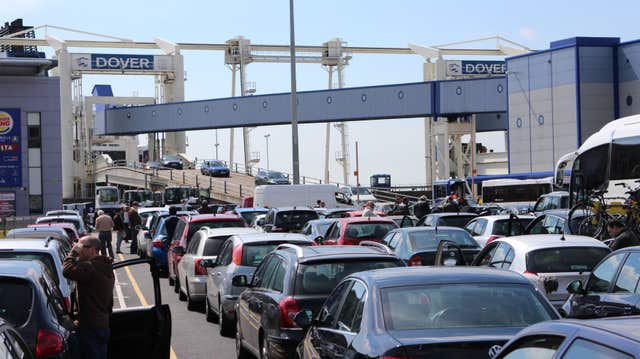
With the EU and UK issuing guidance on preparations for a no-deal Brexit, here are some pointers on what leaving the EU without a Withdrawal Agreement on March 29 2019 might mean.
– There would be no 21-month transition period to December 2020, so businesses and public bodies would have to respond immediately to changes in the rules governing their operations.
– Protections for expatriates agreed as part of withdrawal negotiations could be torn up, creating uncertainty over the legal rights to live and work of 1.3 million Britons in EU states and 3.7 million Europeans in the UK.
– Relevant EU laws would be transferred onto the UK statute book under the terms of the EU Withdrawal Act, so there would be no black holes in Britain’s lawbook.
– The most immediately visible impact would probably be at borders and ports, with fears of long queues if either side decides to impose heightened passport or customs checks. The UK would be free to set its own controls on immigration by EU nationals.
 There are fears of queues at ports like Dover if Britain leaves the EU without a deal (Steve Parsons/PA)
There are fears of queues at ports like Dover if Britain leaves the EU without a deal (Steve Parsons/PA)
– Delays to cross-Channel freight due to new customs, sanitary and phytosanitary checks could hit supplies of food and other goods. Britain could opt to waive checks to help keep traffic moving, but this may not be matched by the EU.
– Without a trade deal for goods, the UK would have to fall back on World Trade Organisation rules, which require tariffs on products ranging from 4% on liquefied natural gas to 9.8% on cars and 32% on wine. Britain would trade with the EU under the WTO’s “most favoured nation” status, preventing either side from imposing punitive tariffs, but the move away from frictionless zero-tariff trade is certain to drive up prices in the shops.
– Britain would be free to sign new free trade deals with countries around the world, and negotiations would get under way in earnest with states like the US and Australia. But these talks could last years, and in the meantime, the UK would lose access to free trade deals the EU has struck with dozens of countries, including Japan, Canada and South Korea.
– Opponents of a no-deal Brexit warn that major manufacturers in sectors like automotive, aerospace and pharmaceuticals would shift operations from the UK into the remaining 27 EU states in order to avoid delays and disruption to products and components crossing the border.
– Financial institutions in the City of London and other centres around the UK would lose their “passporting” rights to operate in EU countries, and could activate contingency plans to move some or all of their operations overseas.
 Britain would halt annual payments of around £13 billion to the EU after a no-deal Brexit (Dominic Lipinski/PA)
Britain would halt annual payments of around £13 billion to the EU after a no-deal Brexit (Dominic Lipinski/PA)
– The UK’s annual contributions of around £13 billion to EU budgets would cease, providing an instant windfall to the Government. But there would be pressure on ministers to make up the loss of Common Agricultural Policy subsidies totalling £3 billion to farmers, as well as EU support for science and disadvantaged regions.
– New arrangements would have to be made to certify UK aviation for safety in order to ensure that planes are not grounded.
– Britain’s agreement to pay a “divorce bill” of up to £39 billion would be void, and a House of Lords report has suggested that the money would no longer be payable. But some legal experts believe the EU could take the UK to the International Court of Justice to recoup the cash, which represents payments to which Britain committed itself while a member.
– Britain would no longer be bound by the rulings of the European Court of Justice in Luxembourg. But it would continue to be subject to the European Court of Human Rights in Strasbourg, which is not an EU body.
– Professionals may find that qualifications obtained in the UK are no longer recognised in EU states, and may have to obtain new authorisations in order to continue to practise.
– Individuals and businesses could lose the right to apply for EU grants or tender for work with EU institutions.
– The status of the 300-mile Northern Irish border with the Republic would be unresolved. Both Britain and Dublin have said they will not put physical infrastructure on the border. But the Republic would come under intense pressure from Brussels to exert customs and immigration controls on what would become a new external frontier for the EU.



Why are you making commenting on The Herald only available to subscribers?
It should have been a safe space for informed debate, somewhere for readers to discuss issues around the biggest stories of the day, but all too often the below the line comments on most websites have become bogged down by off-topic discussions and abuse.
heraldscotland.com is tackling this problem by allowing only subscribers to comment.
We are doing this to improve the experience for our loyal readers and we believe it will reduce the ability of trolls and troublemakers, who occasionally find their way onto our site, to abuse our journalists and readers. We also hope it will help the comments section fulfil its promise as a part of Scotland's conversation with itself.
We are lucky at The Herald. We are read by an informed, educated readership who can add their knowledge and insights to our stories.
That is invaluable.
We are making the subscriber-only change to support our valued readers, who tell us they don't want the site cluttered up with irrelevant comments, untruths and abuse.
In the past, the journalist’s job was to collect and distribute information to the audience. Technology means that readers can shape a discussion. We look forward to hearing from you on heraldscotland.com
Comments & Moderation
Readers’ comments: You are personally liable for the content of any comments you upload to this website, so please act responsibly. We do not pre-moderate or monitor readers’ comments appearing on our websites, but we do post-moderate in response to complaints we receive or otherwise when a potential problem comes to our attention. You can make a complaint by using the ‘report this post’ link . We may then apply our discretion under the user terms to amend or delete comments.
Post moderation is undertaken full-time 9am-6pm on weekdays, and on a part-time basis outwith those hours.
Read the rules hereLast Updated:
Report this comment Cancel